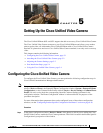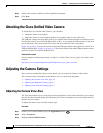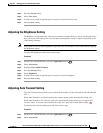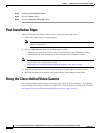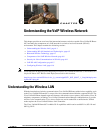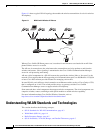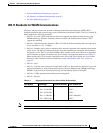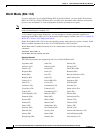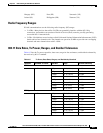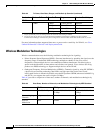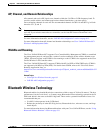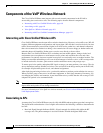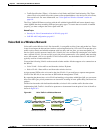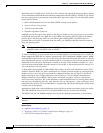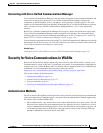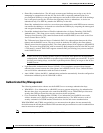
6-5
Cisco Unified IP Phone 8961, 9951, and 9971 Administration Guide for Cisco Unified Communications Manager 8.5 (SIP)
OL-20861-01
Chapter 6 Understanding the VoIP Wireless Network
Understanding WLAN Standards and Technologies
Radio Frequency Ranges
WLAN communications use the following radio frequency (RF) ranges:
• 2.4 GHz—Many devices that utilize 2.4 GHz can potentially interfere with the 802.11b/g
connection. An interferer can produce a Denial of Service (DoS) scenario, possibly preventing
successful 802.11 transmissions.
• 5 GHz—Divided into several sections called Unlicensed National Information Infrastructure (UNII)
bands and has four channels each. The channels are spaced at 20
MHz to provide non-overlapping
channels and more channels than with 2.4
GHz.
802.11 Data Rates, Tx Power, Ranges, and Decibel Tolerances
Table 6-2 lists the Tx power capacities, data rates, ranges in feet and meters, and decibels tolerated by
the receiver by 801.11 standard.
Hungary (HU) Peru (PE) Venezuela (VE)
Iceland (IS) Philippines (PH) Vietnam (VN)
Table 6-2 Tx Power, Data Rates, Ranges, and Decibels by Standard
Standard Maximum Tx Power
1
Data Rate
2
Range Receiver Sensitivity
802.11a
16 dBm 6 Mbps 604 ft (184 m) -91 dBm
9 Mbps 604 ft (184 m) -90 dBm
12 Mbps 551 ft (168 m) -88 dBm
18 Mbps 545 ft (166 m) -86 dBm
24 Mbps 512 ft (156 m) -82 dBm
36 Mbps 420 ft (128 m) -80 dBm
48 Mbps 322 ft (98 m) -77 dBm
54 Mbps 289 ft (88 m) -75 dBm
802.11g
16 dBm 6 Mbps 709 ft (216 m) -91 dBm
9 Mbps 650 ft (198 m) -90 dBm
12 Mbps 623 ft (190 m) -87 dBm
18 Mbps 623 ft (190 m) -86 dBm
24 Mbps 623 ft (190 m) -82 dBm
36 Mbps 495 ft (151 m) -80 dBm
48 Mbps 413 ft (126 m) -77 dBm
54 Mbps 394 ft (120 m) -76 dBm



